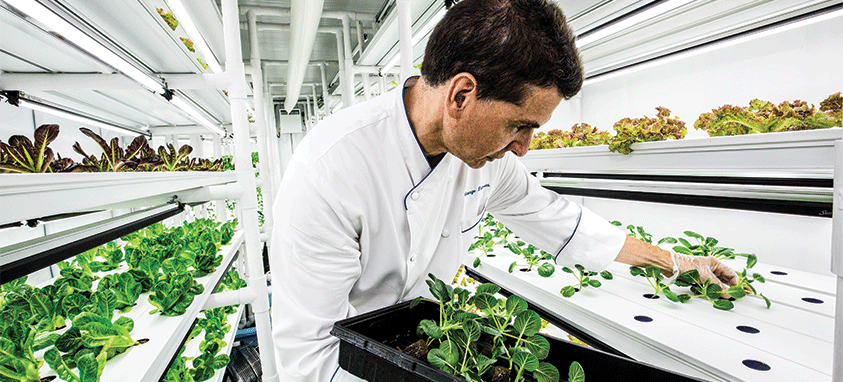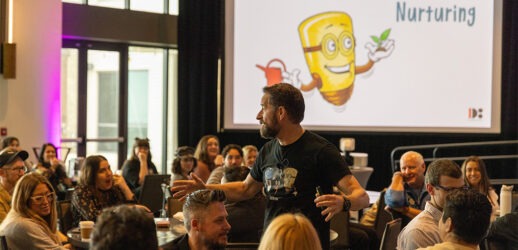“The 2020s will be the decade of the Vertical Agriculture Revolution,” proclaims futurist Ray Kurzweil, who’s also director of engineering at Google. He’s referring to veggies and herbs grown sustainably indoors without dirt, using hydroponic (plants rooted in nutrient-rich liquid) or aeroponic (no growing medium) technology and often arrayed as a living wall.
Well, the revolution is a-dawning. These hotels and event venues are already harvesting their lush indoor gardens to serve meeting attendees.
Why is that important? It’s estimated the average American meal travels 1,500 miles from farm to plate, burning fossil fuels and emitting CO2. Not only do vertical gardens vastly reduce “food miles,” they use 95 percent less water than traditional farms, according to David Martin, CEO of Indoor Farms of America.
Plus, in regions with cold winters, the veggies keep coming; in those with lettuce-wilting summers, the greens can be as chill as they yearn to be.
And how cool is it to know your salad, just a short time ago, was radiantly alive and hanging out nearby?
The Ritz-Carlton, Naples
Naples, Florida
At this high-end property, The Grow House is a repurposed shipping container retrofitted with a hydroponic vertical growing system that yields a large portion of the greens served at its restaurants, from lettuces—30,000 heads a year!—to spinach, cilantro and micro-greens (pictured above). Executive Chef George Fistrovich told AgFunderNews he couldn’t be happier. “Especially considering that we are growing lettuce in Florida during August, when it’s 105 degrees outside with 90 percent humidity,” he added.
MGM Grand
Las Vegas, Nevada
For MPI’s World Education Congress 2017, attendees were served lettuces grown—and prominently on display—in The Farm at MGM, the first vertical farming area at an MGM property. The demonstration project was created by Indoor Farms of America, a Las Vegas-based company, and CEO Martin extoled its benefits as attendees nibbled salads. “We have a farm in a village in Botswana,” he said. “They can’t do dirt farming because of a water shortage.”
Omni Amelia Island Plantation Resort
Fernandina Beach, Florida
The Sprouting Project on this luxury property adds aquaculture to the indoor farm. Blue gill, sunfish and other freshwater fish feast on organic food in two 500-gallon tanks. Plants are fed with nutrient-rich “fish water,” filtering and purifying it before it goes back to the fish tanks. Yields are harvested in about half the time as a traditional soil garden. Dinners can be booked at a special garden table.
Mercure Paris Boulogne
Paris, France
On the rooftop of this recently renovated, 191-room hotel in the Boulogne and Issy-les-Moulineaux business districts is a seasonal aeroponic farm that grows rare strawberries, heirloom tomatoes, eggplant, herbs and lettuces without fertilizers or pesticides—so much that a quarter of the harvest is used by the hotel restaurant; the rest is sold in baskets. All of which aligns with AccorHotels’ target of having 1,000 vegetable gardens at its properties by 2020.
Greater Columbus Convention Center
Columbus, Ohio
“Grown 75 feet from our kitchen. Local enough?” That’s the provocative question posted above Smart Farm, a vertical garden on public view at this recently expanded facility. For one event, basil was harvested for a gazpacho and as garnish on a cocktail made with local vodka and honey. For another upcoming event, catering is working with menu planners to grow and feature mustard greens in red shiso pickle and shiso giardniera.




